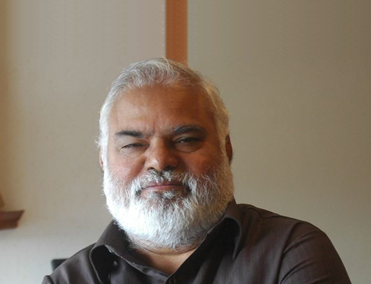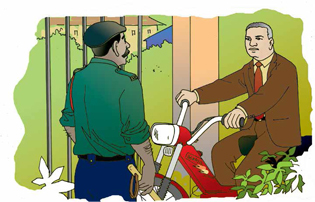
Those days, generally I would either walk or cycle, if I had to commute anywhere. I was totally involved with students, as besides being the Director, I was also the Rector of the institute’s girls’ and boys’ hostel. My students would often see me using these humble modes of transport
Protocol means the system of rules governing formal occasions or the accepted way to behave in a particular situation. A chief guest in a corporate function is a VIP who characteristically comes in a C-suite. He or she is driven in an elegant car, at times escorted by team members of the organisers of the event. This corporate culture portrays a professional image and conveys executive presence. It reflects the respectful attitude towards the personality who is held in high esteem in the corporate world. Any deviation from norm is just not acceptable, as I discovered one day, when I was invited as a chief guest.
Until then, for me, a chief guest was primarily a person who has a certain standing in the society due to his or her academic qualifications/ his professional designation/his contribution to society. He enhances the status of the function due to his high profile. His other qualities include good oratory to guide the respective audience and enlighten them about a topic relevant to the event.
Those were the days when my career was in full bloom. I was the Director of a leading management institute. I had also been recently designated as Honorary Colonel by the President of India. I was the first citizen to receive this prestigious designation - there is no such precedent in the history of India. This was conferred on me for my contribution in the field of management education.
I received an invitation from the College of Agriculture, Pune, to be the chief guest, to address trainee officers who were to come from different parts of the country. I accepted the invitation and declined their offer to send me a car to fetch me. I thought, why trouble them, when I can easily come on my own, considering the short distance that I had to travel.
Those days, generally I would either walk or cycle, if I had to commute anywhere. Just recently, I had been promoted as Professor and that’s when I upgraded myself to commuting in an auto rickshaw. I was nicknamed ‘Autowala Bala’.
I was in close interaction with students, as, besides being the Director, I was also the Rector of the institute’s girls and boys hostel. My students would often see me using these humble modes of transport. One day, one of the girls who had just finished her MBA course came to me and said, “You work so hard day and night for us, so I want to give you a gift as a token for your dedication towards us.” She also said, “You are such a great man and still you do not own a vehicle.” I told her I don’t accept any gifts. She insisted that she wanted to gift me her Luna, as she was going back to her home town so would not need it anymore. When I insisted that I do not accept any gift, she said `okay, then give me some token.’ I asked her how much would that token be and she said, Rs.3,000. I was thrilled that she was giving it to me at such a cheap price and instantly bought it.
A few days later, I was riding the Luna out of the college, when the watchman at the gate stopped me and said, “So finally you bought the Luna? And for how much?’’ I eloquently quipped, “Rs.3,000.’’ He instantly said, “Oh Sir, she has made a fool of you. She was going around quoting Rs.1,000 to so many people and there were no takers.’’ Now, what to say? I kept quiet. Incidentally, to date, my only two-wheeler has been this Luna and a TVS Moped. I don’t know how to ride a scooter or drive a car even today.

I was very proud of owning the Luna – the reason why I did not accept the offer by the College of Agriculture hosts, to send me a car. On D-Day, I dressed up in my formal suit and tie and rode the Luna to reach the venue.
When I reached the College of Agriculture, the main gate was closed. I could see a banner put up, welcoming me. I tried to explain to the security guard at the gate that I was the chief guest. He ignored the fact that I was dressed in a formal suit and tie – instead he was staring at the Luna. He could not believe that I was the VIP and refused to open the gate. Instead, he rudely asked me “Who are you?” I was anxiously trying to grab attention by waving my hands to signal to the hosts, far off. It’s quite a bit of distance between the main gate and the main building of this college, so, it is difficult for anyone to understand what someone is gesturing from the gate. Finally, I could see my hosts recognising me and coming towards me. I heaved a sigh of relief.
But when they reached me, the first thing they asked was, “Why have you come on a Luna? We could have sent you a car.’’ Their body language reflected their discomfort at my having come in what I considered a prized possession. Not only that, they asked me to leave the Luna at the gate. I was surprised that my humble vehicle could cause so much embarrassment to the hosts.
I said, “What is wrong with my coming on a Luna? I’m sorry I cannot leave it at the gate, I will ride on it up to the venue,’’ and did so. So, right from the security guard to my esteemed hosts, my personality got diluted because of the Luna.
Anyway, the function began and I took on the microphone to address the trainee officers. I narrated the entire incident to them and told them that ‘dikhava’ (flaunting) matters more than my qualification as the Director of a prestigious institute or the designation of an Honorary Colonel. Not coming by car was my disqualification. Thereafter, I gave a 90 minute speech and received a thunderous applause.
On introspection, I realise that I should have taken certain precautions instead of taking things for granted. A uniform or an attire for a certain occasion automatically lends respect. A traffic policeman on the street for example, commands respect because of his uniform. How many of us would care for his whistling or his directions for traffic if he was dressed in plain clothes? So, an appropriate dress code is immensely important, depending on the event or function. Similarly, I realised that a car provided a status – it is a way of honouring the special guest who is the face for the event. Hence, I should have accepted the offer of the organisers to send a car to fetch me.
I should have realised that I was not an iconic figure like Amitabh Bachchan or the Prime Minister of India, to be instantly recognised wherever I went. In this case, my first encounter was with the security guard, who was not literate. It is a known fact that security agencies employ poor, elderly people who are in need of money and work for a pittance. They carry out their jobs like a post-retirement, pastime occupation, often dozing off during duty hours. Thus, I found it very difficult to communicate with this guard, to drive home my point. I should have anticipated that. Perhaps, I should have brought along the invitation card with me, which would have served as a proof of my VIP status and which would have convinced even this illiterate security guard to allow me entry.
For me, this was a great learning. Never take things for granted. Never go beyond the protocol when it comes to a formal occasion. It has its own significance, which must be respected.
By DR (Col.) A. BALASUBRAMANIAN
editor-in-chief